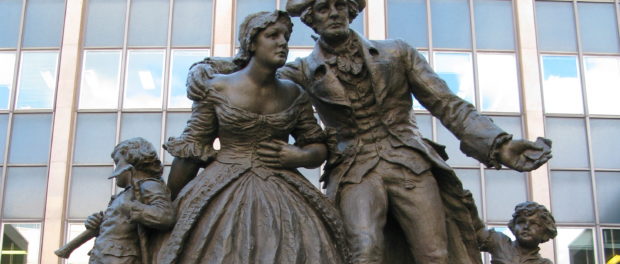1783-84: Exodus of the Loyalists & Other Quebec Curios
Part of “A Colony in Transition, 1763-1791”
Despite the sheer unity and enthusiasm that most films and biopics set during the American Revolution tend to portray, most historians say that only one third of the population of the Thirteen Colonies supported the Revolutionaries. One third were the Loyalists, and curiously, the other one third of the population didn’t care either way.
As the name implies, Loyalists were people who supported Britain during the American Revolution. They were not all rich people who were scared their property was going to be taken away; the majority of Loyalists were actually labourers like other Revolutionaries such as Moses Hazen. However, instead of rejecting the Crown, the Loyalists identified with the Crown. A lot of Loyalists were white people, but there were a considerable number of black Loyalists. Some believed that a peaceful solution between the Colonies and Britain could be worked out instead of a full-on War. When the Revolutionary War broke out, the Loyalists would fight on the British side instead of the various Colonial and Congressional armies. Known Loyalists in the Colonies would be subject to humiliation and ridicule by people supporting the Revolutionaries, including a form of punishment called tarring and feathering; there are also accounts of Loyalists being killed by unruly mobs because they were deemed to be on the “wrong side”.
When the War ended, following the conclusion of the Treaty of Paris (an upcoming subject in this column), Loyalists would be driven out of the Colonies, mostly New York, which had been under British control throughout the War. Many of them would move north towards present-day Nova Scotia, where they would often keep to their own community of fellow Loyalists instead of integrating. Some Loyalists, if they had served in the military, would be given land grants, but some were unable to settle and ended up moving back to the Colonies, whereupon their return they would often be humiliated by the former Revolutionaries. In order to accommodate a great exodus of people for the time—historians suggest approximately 50 000 came north—there would have to be a great deal of record-keeping.
The names of some Loyalists would be put into a book called the “Book of Negroes”. While people have stopped using this term to designate people of African-American descent since the 1960s, the word is important because this is what people called both black people and people that were of mixed descent (“mulattoes”). Commissioned by Sir Guy Carleton to ensure safe passage and accurate records of all the people that entered the Province of Quebec and surrounding territory, this record was special and separate because slavery was still legal in the British colonies at the time, including Quebec. This record shows who was coming to Quebec, with additional useful information for historians such as their status, if they had served in the military, where they were headed, and their potential “value” if it was discovered that they had run away. However, if it had been discovered these people did run away from their “owners”, they would not get the person back, because the British had promised that any slave who participated on their side would gain their freedom. Instead, former owners would be compensated. Only a handful of cases such as these have been found throughout history.
The arrival of the Loyalists would shift the remaining British possessions in North America to a predominantly English-speaking people. The French Canadians would become the minority. This demographic change alone would have its own implications further on in history.
To honour the Loyalists, Sir Guy Carleton awarded the title of United Empire Loyalist to any Loyalist that emigrated from the Thirteen Colonies. You can find a website dedicated to tracing and celebrating their heritage here.






